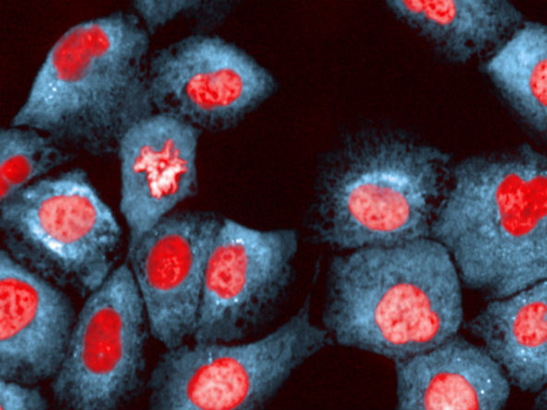-945x532.jpg)
Image: breast cancer cells (Credit: Julia Sero)
Researchers have identified a vulnerability in some breast cancer cells of a certain type – called triple negative breast cancer – that could be exploited by future targeted drugs.
The vulnerable cells carry a genetic mutation that makes them more dependent on a protein called SKP2 to regulate their growth and division.
Knocking out the protein with a targeted drug could kill SKP2-dependent cancer cells.
In a new study, scientists from The Institute of Cancer Research, London, show that blocking the protein’s activity kills the vulnerable cells, while sparing cells without the mutation.
This makes it a promising target for new treatments, which could selectively kill the cancerous cells by inhibiting the protein’s activity.
Such a treatment is sorely needed, as triple negative breast cancer cells do not respond to many of the hormone therapies used for other types of breast cancer.
The research was funded by Breast Cancer Now and Cancer Research UK, and supported by the NIHR Biomedical Research Centre at The Royal Marsden NHS Foundation Trust and The Institute of Cancer Research (ICR).
Researchers at The Breast Cancer Now Toby Robins Research Centre lead important study programmes to understand the genetic and environmental causes of breast cancer.
Exploiting the cells’ vulnerability
Writing in the journal Oncogene, the researchers describe how they identified the vulnerability by focusing on cells with a mutation to a gene called the retinoblastoma gene (RB1), which is linked to several cancer types.
The gene helps to regulate the division of cells, but is commonly mutated in triple negative breast cancer – leaving these cells more dependent on other mechanisms to control their division, and therefore continued survival.
The phrase ‘synthetic lethality’ is used by scientists to describe this sort of situation – when a cancer becomes overly reliant on a limited number of cellular systems to survive because of mutated genes.
Scientists including Professor Chris Lord have been instrumental in research to discover and exploit synthetic lethality in cancer, most famously in studies that underpinned the development of PARP inhibitors like olaparib to treat BRCA-mutated cancers.
'Improving prognosis' for breast cancer patients
In the new study, the researchers used their knowledge that some cells were over-reliant on RB1 to screen for other genes whose inhibition would be harmful to a high proportion of RB1 mutated cells, while having a minimal effect on cells without an RB1 mutation.
This led the team to the protein SKP2, which seemed to be more active in cells with an RB1 mutation.
They found that switching off the gene that carries the instructions for making SKP2 was fatal to 92 per cent of triple negative breast cancer cells with a RB1 mutation.
They also found that using a molecule to block the protein’s activity directly killed the cells with the RB1 mutation.
Professor Chris Lord, leader of the Gene Function Team in the Breast Cancer Now Toby Robins Research Centre at the ICR, led the research. He said: “Our research suggests that inhibiting SKP2 could give rise to synthetic lethal effects in cells with an RB1 mutation.
“A new targeted therapy that exploits this vulnerability could improve the prognosis for some of the 15 per cent of breast cancer patients whose disease is classified as triple negative.”
